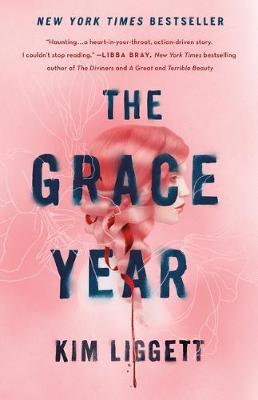
A New York Times bestselling dark speculative feminist thriller in the vein of THE POWER and THE HANDMAID'S TALE. Optioned for film by Universal and Elizabeth Banks.
The resistance starts here...
No one speaks of the grace year.
It's forbidden.
We're told we have the power to lure grown men from their beds, make boys lose their minds, and drive the wives mad with jealousy. That's why we're banished for our sixteenth year, to release our magic into the wild before we're allowed to return to civilisation.
But I don't feel powerful.
I don't feel magical.Tierney James lives in an isolated village where girls are banished at sixteen to the northern forest to brave the wilderness - and each other - for a year. They must rid themselves of their dangerous magic before returning purified and ready to marry - if they're lucky.
It is forbidden to speak of the grace year, but even so every girl knows that the coming year will change them - if they survive it...
A critically acclaimed page-turning feminist dystopia about a young woman trapped in an oppressive society, fighting to take control of her own life.
- ISBN10 1250145449
- ISBN13 9781250145444
- Publish Date 8 October 2019
- Publish Status Active
- Publish Country US
- Imprint St Martin's Press
- Format Hardcover
- Pages 416
- Language English
Reviews


Kim Deister
It’s only eleven days into the year, and I’m pretty sure I’ve read my favorite book this year. But it’s going to take a lot to measure up to this book, to how it made me feel, to how it affected my thinking. It is the kind of book that truly affects you and changes you. It was somehow both beautiful and terrifying, deeply emotional.
The novel is dystopian, revolving around an insular society that feels entirely possible and believable. The book opens with two quotes…
"A rat in a maze is free to go anywhere, as long as it stays inside the maze." -The Handmaid’s Tale, Margaret Atwood
"Maybe there is a beast… maybe it’s only us." Lord of the Flies, William Golding
The first quote is from my favorite book, the second from one of my least favorites. But both are utterly perfect representations for what The Grace Year is, with elements from both. As a dystopian novel, the story told is that of extremes. But at the fundamental level, after stripping away those extremes, I think it’s safe to say most, if not all, girls and women have experienced moments like those within the story. Moments of powerlessness, of misognyny, of in-fighting between women.
The story is brought to life by the writing, which is breathtakingly beautiful to read. It draws the reader in and makes them feel every nuance of the story. Liggett doesn’t shy away from the hard moments, which I truly appreciated. The world in which these girls and women live is hard and shouldn’t be glossed over. It’s a world in which women are subjugated, happy endings neither expected nor even truly dreamed of. Yet, as horrifying as much of the book was, I was left feeling proud of my womanhood, even hopeful. It is an allegory for the female experience, created in an extremely entertaining and engrossing way.
This is a book that a reader needs to begin with an open mind and heart, which is why I shared little of the plot. It’s a book that needs to be experienced on a personal level.
Some notable quotes...
"Tonight, I became a wife.
All because a boy claimed it so."
"The grace year is ours. This is the one place we can be free. There’s no more tempering our feelings, no more swallowing our pride. Here we can be whatever we want."
"I mean… who doesn’t want to feel powerful? Who doesn’t want to feel like they’re in control for once in their lives? Because without it, what would we be?"
"We hurt each other because it’s the only way we’re permitted to show our anger. When our choices are taken from us, the fire builds within."
"My eyes are wide open, and I see everything now."

Veronica 🦦
Go into this book blind! Do not read any review of this book until you are done and simply wish to digest what you’ve read. You will enjoy it so much more if you don’t know what you’re about to witness in these pages.

limabean74
I am glad I read the book just don't know who I feel about it yet.

Beth C.
My first thought is that this book is akin to Lord of the Flies - but with more nuance and, ultimately, hope. It explores not only societal pressures and how damaging they can be, but also the damage we females do to EACH OTHER - even when we have common cause and the same enemy. Sexism is rampant, and the Grace Year girls are no longer even *people* to one group of males, but prey. Nameless, and even almost faceless to these men who hunt them. The patriarchy rules, and its "justice" is absolute, controlling everything they're allowed to do, and terrified of their "magic" that would have them seducing all the men in the village and corrupting other women. Because that's always the way, isn't it? Magic is that nebulous, fantastical thing that can't be proven and provides all the context for the fear and power men need to control women.
I won't spoil the book, nor will I go much into the ending. But it was so beautiful and perfect, and I re-read it three times. Please - read this book. Read it with your teens if you have them (male *and* female). Read it with your high school classes. But read it. It's a powerful testament to girls and women - both their cruelty, and the *actual* power they have to make change.

girlinthepages
The Grace Year is set in a rather ambiguous setting, and the vague world building aids in creating a creepy and unsettling backdrop for the story. As a reader, you never know if it's set in the past, present or future, if the whole world is like "the county" or if they're just some weird, isolated cult (it honestly gave me vibes similar to that horror movie The Village). Yet keeping the specifics murky really aided the overall tone, and rather than focusing on the wider political structure of the society the focus is on how the politics and societal expectations all manifest in the protagonist, Tierney. Tierney seems to be the only girl who questions the rules of the county and its horrifying tradition of the Grace Year, when teenage girls of a certain age are left to fend for themselves for a year and those who come back are mere shadows of themselves. The explanation is for the women to rid themselves of dangerous "magic," but it's really an exercise in patriarchal dominance, pitting the women against each other in an isolated environment that is a ripe environment for betrayal, paranoia and mistrust. It's definitely a book that has horror-type elements, but the true horror is really what humans can do to each other.
There's no shortage of horrors in this novel, from the physical, graphic incidents to the debilitating mental states the girls often find themselves in. Liggett truly makes you feel the desperation, the fear of barely clinging to survival, and the sheer will to live, all emotions that Tierney cycles through at various points throughout the story. At first I was concerned I wouldn't like her as a protagonist, that she was going to be the "I'm not like other girls because I'm a tomboy" trope, but as the novel progressed the depth of Tierney's resourcefulness, determination and strength eventually won me over. About midway through the novel I was worried my respect for the characters would start to due to the introduction of a romance (*cue me waving a large sign saying NOT EVERY BOOK NEEDS ROMANCE*) however it eventually serves an important, larger purpose in the overall plot of the book and I found myself thinking it was brilliant at the end.
Speaking of the ending, I was BLOWN AWAY by how the book wrapped up. I was NOT expecting the reveal that happened when the girls returned home from their Grace Year and it was really well crafted by the author. It took a situation that seems like would undermine everything Tierney fought for over the course of the year and inverted it to something she used to reclaim power and sow the seed of hope in a slowly blooming revolution. While the last few pages were so ambiguous I did find myself having to google how it ended to ensure I understood it correctly (which I'm still honestly not sure if I understand) it's a book that left me reeling for days and one that I know will stick with me. I desperately wish we had a sequel, but I also thinking there's strength in the ambiguity of the ending.
Overall: This is a story about horrors and despair, exploring the disturbing depths humans can sink to. However, it is also a story of small kindnesses, though exercised infrequently or unexpectedly, that can strengthen hope and resolve in even the bleakest of circumstances. How one person's kindness can be enough to spark an ember that could lead to massive change.
Blog | Twitter | Instagram | Goodreads This review was originally posted on Girl in the Pages

maggiefan

chymerra
The plotline of The Grace Year sucked me in. It was well written and fast. Yes, quick. This book took place over the girls 16th year, and it flew. Oh, man, it did fly. I loved it!!
I liked Tierney. She was one of the most influential female main characters that I have read to date. I liked that in a society that viewed women as the lesser sex, she wasn’t afraid to voice her opinion. I loved that she didn’t want a man to make her happy. But I felt that her behavior in the last half of the book contradicted that. But that is what made me like her character so much!!!
Tierney and Ryker’s storyline was interesting to read. I am not going to get into it because there are some significant spoilers. All I have to say is that there were times where I was heartbroken and then times where I was elated. I know, such a contradiction but once you read the book, you will understand.
The plotline with Hans surprised me. I was not expecting him to do what he did. I put the book down and said, “No way.” Then picked the book back up and continued reading. It explained so much. So much!!!
I do want to comment on the women in the village. I thought one thing when I started reading the book. By the end of the book, my view about them changed. Tierney’s mother was a huge one.
The end of The Grace Year made me cry. All I have to say is that it was bittersweet. Because of the way it ended, I am hoping that there is a book 2.

shannonmiz
"They can call it magic.
I can call it madness.
But one thing is certain.
There is no grace here."
Some things I enjoy in general:
- • Dystopians
- • Awesome book covers
- • Fiercely feminist media
- • Kim Liggett
You see where I'm going with this? The Grace Year has basically every hallmark I look for in a book. From grittiness, to competition, to forbidden love, it basically runs the gamut of awesome. I am going to delve deeper into some of what made this one extra good for me!
- • Stunning exploration of the patriarchy pitting women against each other. Oh this happens constantly, and throughout time. But the way the author pares it down to the basics of quite literally forcing the women to mistrust each other is an incredible allegory to our current society.
- • Such gritty, dark undertones set the ambiance of the book perfectly. I mean, for a pretty large portion of the book, the girls are living in actual filth and squalor. But it just feels so... demoralizing. Which, of course, is the point. Liggett does a tremendous job of making the reader feel the desperation of the situation. More than that, she also makes us feel even the day to day weights that lie on the women's shoulders. So even when they're in a seemingly civilized environment, the dread permeates. It's fantastic.
- • Tierney is awesome and impossible not to root for. I mean, she's super smart which is helpful, but she also acknowledges that her dad treating her a little better than other dads helped give her an advantage too. She's incredible from start to finish, flawed yet completely relatable. She has her friends and family who she's not keen on leaving for the Grace Year, but I mean, who is? And when she gets there... wow. All the complex relationships she forms will blow you away, no doubt.
- • The turn it took, the end, it kind of blew my mind. I was sure I knew where this book was headed. I could not have been more wrong. And when I finished, I was floored. It took me a minute to figure out how I felt about it, (thanks to Emma for chatting about it with me)! I realized that I loved it, and the message it sent. I obviously have to be vague here but if you have read it... DM me or leave a comment or something because I have thoughts!
- • It's just a good story. At the end of the day, this matters. A book can throw all the messages at you, but if you're bored, who cares. This book was not only profound, but was entertaining as hell, too.
Bottom Line: The more I think about this book, the more I love it. And trust that I have not stopped thinking about it since I read it.

Jo
Trigger & content warnings are under spoiler tags because there are quite a lot of them.
Trigger/Content Warnings: This book features pregnancy, birth, bullying, death, ogling, discussion of sex, fade-to-black sex scene, sex shaming language, predators, sexual assault, forced prostitution, rape culture, violence against women, execution by hanging, forced watching of execution, discussion of skinning girls alive, an axe wound, suicide, cannibalism, transphobia: girl grabbed by the crotch to "check" she's not "really" a boy, homophobia: same sex attraction leads to violent punishment, acting on same sex attraction is punishable by death, and purposeful public outing of lesbian character.
Marketed as The Handmaid's Tale meets Lord of the Flies, The Grace Year by Kim Liggett sounded absolutely right up my street! And while it has an incredible premise, and started off really strong, I ultimately found it quite disappointing and forgetable.
Tierney lives in this incredibly patriachal society, where men oppress women for the sake of control and because of fear. I woman is to be seen and not heard, be a wife, and produce babies - preferably sons. During their sixteenth year, all girls are sent off to an isolated island, and locked inside an infenced encampment, for their grace year. They spend their whole year there to rid themselves of their magic. Because all girls have magic: it makes the men crazy with lust and makes wives jealous. The day before the start of their grace year, the women are all lined up, after all the men have discussed and decided which girls will become the wives the eligible men. There are always more grace year girls than there are eligible men. The men give veils to their chosen intended, and that's that. The women have no say. They're then sent off on their grace year with the understanding that when they come back - if they come back, because never does everyone make it home after their grace year - those with veins will become wives, those without will become indentured labourers. This is how it's always been. Once their in their encampment, they are left to their own devices for a full year, to rid themselves of magic, and survive. But with the girls slowly starting having mental issues, and with the poachers - the sons of the women who have been forced into prostitution in the Outskirts as punishment, or sisters sent their if their older sister does not return from their grace year, dead or alive - circling outside the fence, waiting for anyone to leave, so they can skin them alive, (and sell their body parts back to the town, who will consume them to bring back their youth and vitality), 33 girls quickly becomes fewer and fewer.
As I said, The Grace Year started really strong. The town the women live in is horrifying. Women literally have no rights at all. Everything they have is given to them by the men, and the men can just as easily take it away again. They have all the power, and they'll use it. Sick of your wife who isn't getting pregnant? Say you've seen her using magic, and she'll be executed. Then you can find yourself another from this year's grace year girls. It's disgusting, and just so, so awful. I was raging, and I loved it, certain this was going to be a book where, as it's a standalone, we'd see women take back their power. What I read, during the grace year, was women turning against women, because why not take some power when you finally have some freedom?
But also, I kind of just expected more. There was no background for the world building. Why do girls have magic? What actually happens if they don't release it? When was the grace year first thought up? When was it decided that the way the people live now is in the "best interests" for everyone? Why is this world the way it is? I have absolutely no idea, because we're not told anything. And was just really slow. Sometimes it would feel like things were going somewhere, but then you'd discover that actually, months had gone by. I get it, they're spending a whole year there, and there will be times when nothing much of note is going to happen, but to skip months in a few lines? And then having months go by where we see not a huge deal happening at all, really? And when things did happen, they never quite made it to the level of horrifying I was expecting. There was this sense, throughout, that things could get really bad, and at times they do, but it's softened. A lot of it we don't actually see - things are always happening where Tierney is not, and maybe Liggett didn't want the readers having to read such terrible things, or she simply didn't want to have to write them, but I mean we see a an execution at the beginning, and there are other seriously awful - and probably very triggering things, especially when it comes to the trans/homophobia - she does write, I just didn't understand why we didn't see it all. Don't give us this horrific world, and then shy away from the realities of it. I'm not satying I want to see terrible things happen to the girls, but these things aren't just terrible, they also hugely affect the plot, and we just don't see them.
And the way things ended was just so disappointing. I was thinking, "Really, this is the way the story is going to go? This is the path Tierney is taking? After everything? Really?" I got the importance of the very end, but this is a standalone story. Nothing is coming after. And this is what we get? It was such a let down. I just couldn't believe this was the whole story. For me, it just wasn't enough. There was no real closure for me. I just didn't see the point of the story, of reading it, if that was the ending I was getting. And it's also really forgetable; at the time of writing this, I actually forgot what I read. I knew I had a review to write, but couldn't for the life of me remember for what book. I had to look it up. It was that ineffectual for me.
So yeah, this story just wasn't for me, sadly. But a lot of people have really loved it, so do read some other reviews before deciding whether or not to read it.
Thank you to Del Rey via NetGalley for the eProof.
